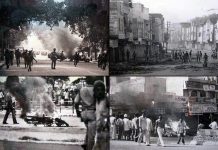
She emerged a different person by waking up in the mornings and scanning newspapers for obituary columns. Literally. That’s how Neelam Krishnamoorthy’s day used to begin after she cremated her 17-year-old daughter Unnati and 13-year-old son Ujjwal. Fifty-seven other people had suffocated to death in Delhi’s Uphaar theatre along with her two children and the papers were full of pieces on how the victims had died slow, painful deaths.
The happy mother of two, who was preparing to send Unnati to college, was content being a partner in her husband Shekhar’s garment export business. Till June 13, 1997. As Neelam, who has now become a role model of sorts for women, says, “I had two choices. I could either sit at home and cry or go out and fight for justice.” She chose the latter mainly because of one thread that emerged from most of the newspaper pieces: that her children died only because of a negligent theatre management. Outrage overtook grief when she read that the Uphaar manager had walked out of the hall, cash box in hand, 15 minutes after the fire started. Fifteen vital minutes in which the victims could have been rescued. “I could not sit back and accept it as fate. All my relatives advised me not to take on a powerful lobby like the Ansals. They advised me to have another child but how could I bring another child into this world when I hadn’t been able to save the two we had?”
Neelam and Shekhar, deserted by their own families and their best friends, decided to create a new family. They scoured the obituaries and started calling homes of other victims. That’s how the Association for the Victims of Uphaar Tragedy (avut) was born. That day, she made a promise to her dead children — that she would ‘avenge’ them by seeing the guilty punished.
Despair and frustration have been constant companions. By day, Neelam is all grit and determination as she sits through prolonged court hearings, making copious notes, briefing the press and ensuring that Uphaar does not go the way Dabwali did. Four hundred school children had died in the Dabwali fire. Untiring when it comes to the court cases, she’s a different person back home. Tired, distraught, hurting like hell… She finds solace in her children’s room where their books, clothes and music is still arranged the way they left it. She has their faces smile back at her through pictures she refuses to garland.
Strength has come through the test by fire. She has broken down, sought a counsellor’s help and been on medication. “I sometimes feel like I have been served a living death sentence,” she says. But Shekhar is there to hold her. His export business has more or less wound up — he needed to travel to Italy and Germany almost every month but doesn’t want to either leave Neelam or the court cases behind.
Keeping the promise has been a physically and emotionally arduous journey. It’s been seven years and the case is still in the lower court. The snail’s pace of the judiciary is frustrating, but it’s satisfying too. With eminent lawyer KTS Tulsi spearheading its legal battle, avut has won a verdict according it compensation, to be paid for by the Ansals and government departments like the Delhi Vidyut Board. It’s not the money the members were looking for. What was important was that the rich and the powerful were asked to pay because they were seen as being culpable.
And so the fight continues. Step by step, bit by bit. Defeat and despair intervene, for a few moments, but the mother has a promise to keep. Not just to her children, but the entire avut family.













